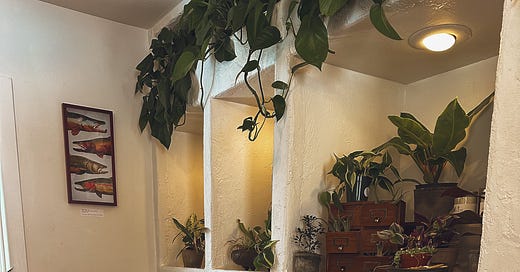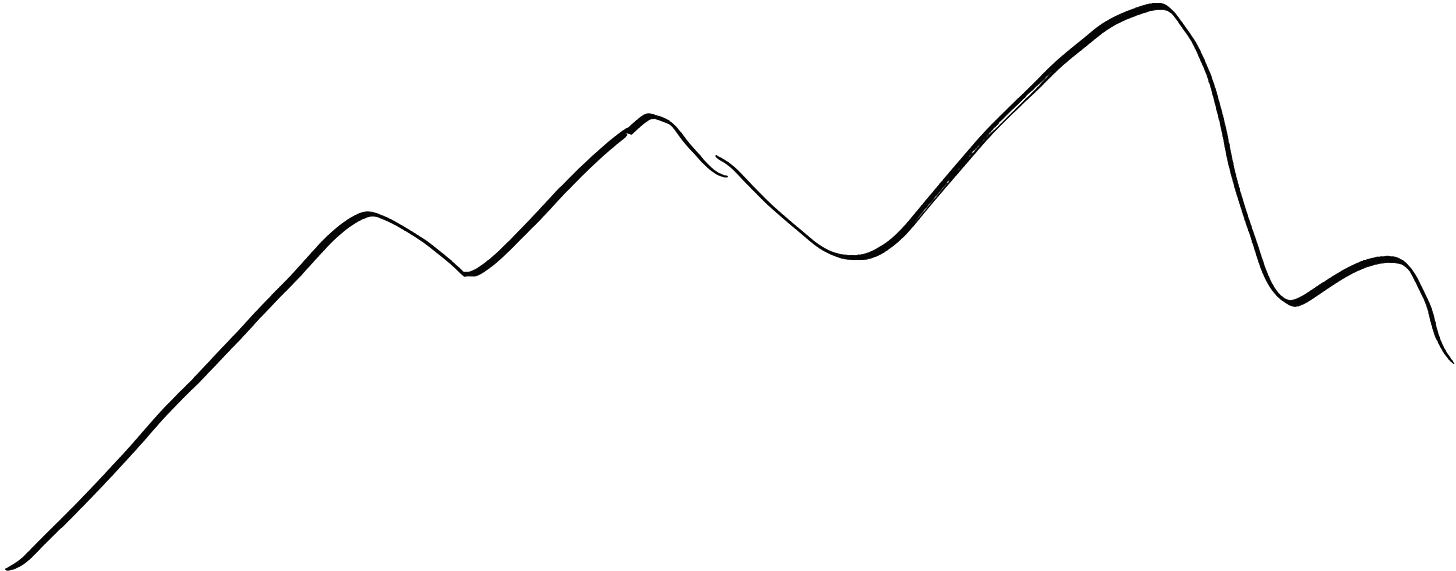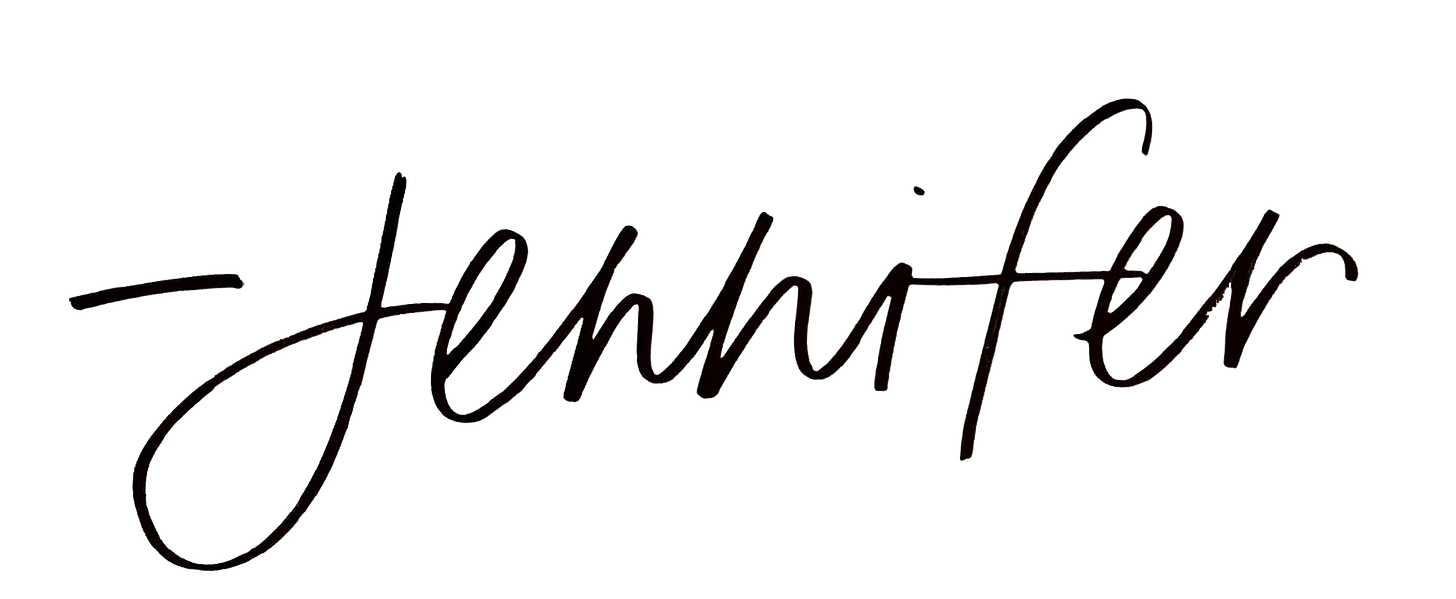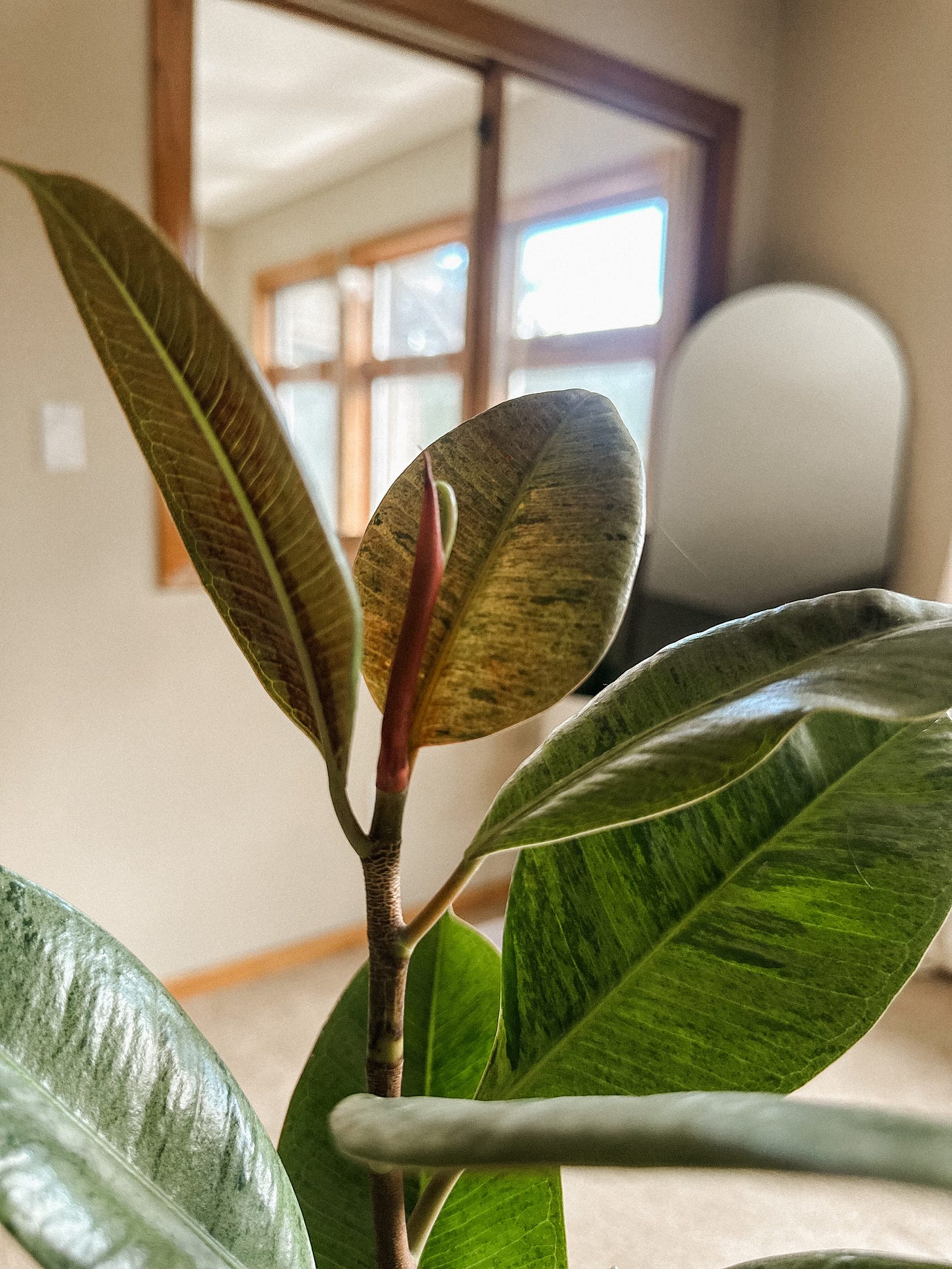I told myself I wouldn’t bring home another plant today.
But then, I pulled into the coffee shop—the one with the warm lighting, the scent of espresso curling through the air, the low hum of conversation settling into the corners like something familiar. This place is more than just coffee. Along the walls, plants grow from insets like they belong there, like the building itself has roots beneath the floor. Lush leaves spill from shelves, trailing vines twist toward the light, and small pots sit quietly on ledges, waiting.
Every time I step inside, I tell myself I’ll leave with nothing more than a cup of something warm in my hands.
But then I saw it.
I did not go looking for a plant that day. Yet there it was, waiting for me among the others as if it had been growing there forever. Small and unassuming, its broad leaves were rich and steady, as it pressed toward the light.
What caught me was the bud.
Near the center of the plant, nestled between the older leaves, was a new one, still tightly curled. It was deep red, thin as paper, wrapped like a secret.
I ran my fingers over it, feeling the firmness beneath my touch. It would unfurl soon, I thought. Maybe in a week, maybe less. I pictured the way it would stretch itself open, slowly, elegantly, until it became another broad leaf reaching for the sun.
I told myself I wouldn’t take a plant home today.
But then, I did.1
I placed it on my desk by the window.
And then, I waited.
At first, I leaned in each morning, looking for the first flicker of movement, the loosening of its edges, the unraveling of green. But days passed, then weeks. The bud remained unchanged.
It had grown—I could tell. It had thickened at the stem, its tip sharper, its edges stronger. But it did not open. It simply stayed. Holding itself in.
Something about that unsettled me.
There was no rush, no sign of urgency in its waiting. It was still becoming, though I could not see it.
I wondered—when did I stop trusting the things that take time?
We are taught to expect things quickly—instant results and immediate answers. The world moves at a speed that does not allow for slow progress.
We buy things already made, already whole. We forget the weight of work in what we hold—the hands that shaped it, the patience woven into its making.
We scroll past moments that took years to build, reducing them to images, headlines, captions. A flick of the thumb, a passing glance.
And yet—we are always hungry.
I feel this hunger in myself.
I write, but too often, I hurry. I move fast so I do not disappear. I fill the blank page with words not because they are ready but because I fear the quiet of an unfinished thought.
But when I think of the most beautiful things I have ever written, I know—they were not rushed. They took time. They needed time.
Like my plant, they had to grow into themselves.
The land does not move at our speed. A river does not carve stone in a day. A tree does not rush to grow its rings. The light shifts across the fields, stretching shadows, drawing gold over the edges of things.
And yet, everything changes. Everything is unfolding.
But at a pace that holds its own wisdom.
I am beginning to think we, too, are meant to move this way.
I see it in the old ways of making:
A loaf of bread rising beneath a cloth, the air thick with the scent of flour and yeast.
A hand weaving thread through fabric, the pattern appearing stitch by stitch, a history told in loops and knots.
A potter’s hands shaping clay, the wheel spinning in slow circles, smoothing the edges into something whole.
There is something sacred in this kind of making—a presence, a rootedness, a resistance to the rush.
I wonder—what have we lost in our forgetting?
We have been taught to see slowness as a lack—of productivity, of progress, of worth.
But the earth moves at its own unhurried rhythm, and nothing is wasted. The river does not rush to carve the canyon, yet the canyon is made. The trees do not force their rings to form, yet the years shape them steady and strong The fields do not bloom all at once, yet season by season, they are clothed in gold.
Behind it all, the Lord is at work—forming, shaping, tending. He is not hurried. He does not rush what He is making. From the shifting of the tides to the unfurling of a leaf, from the rising of the sun to the unseen work in our hearts—His hands are steady. His timing is sure.
If He is not rushed, then surely, neither should we be.
Slowness is not empty. It is full—full of gathering, full of unseen stretching, full of roots pressing deeper before anything appears above the surface.
The leaf knows when to open. It does not ask permission. It does not question whether it is time. It simply waits, and then, quietly, without fanfare, unfurls.
So it is with the work of our hands, the things we make, the lives we are growing into. The words that come slowly are the ones that endure. The art that is shaped with care holds something of its maker. The lives that are built with patience carry a richness that cannot be rushed.
Without a word, the plant on my desk has been reminding me how to wait.
Growth is not always visible. Some things need the hush of waiting before they open. The most beautiful things take time—not because they are uncertain, but because they are deepening into all they were meant to be.
This is the work worth doing—the words worth writing, the art worth making, the life worth living. Not the kind that demands to be finished, but the kind that asks us to wait, to trust, to take root before we bloom.








I love this! And needed it. Our natural world really is our greatest teacher 💚
love this. nature brings so many gifts. x